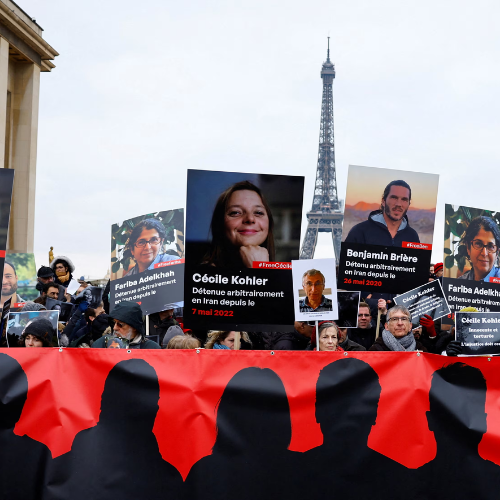On Monday, foreign ministers from the European Union (EU) decided to punish Iran for detaining European citizens in unfair and harsh conditions. They agreed to put strong sanctions on seven people and two organizations in Iran. This step was taken because the EU believes Iran is locking up people unfairly to gain political or diplomatic advantages.
The ministers made this decision during a meeting in Luxembourg. The EU says Iran is using these detentions like a weapon, arresting European citizens and holding them like hostages. Many of these people are dual nationals, which means they are citizens of both Iran and a European country. Iran doesn’t recognize dual citizenship, so it often treats these people as only Iranian and denies them help from their other home countries.
The people and organizations added to the EU’s sanctions list are believed to play a role in these unfair arrests. One of them is the director of a prison in Tehran, the capital of Iran. Other names include judges and court officials who are believed to have been part of the trials and sentencing of these detainees. The Shiraz prison, one of Iran’s major detention centers, was also targeted in the sanctions.
Iran Keeps Focus on Nuclear Program and Sanctions in US Talks
What Do the Sanctions Mean?
The sanctions come with two big punishments. First, any money or property these people or organizations have in Europe is now frozen. That means they can’t access or use their money or assets in any EU country. Second, they are no longer allowed to travel to any country that is part of the European Union. So if they were planning any trips to Europe, they are now blocked.
Sanctions are a way for countries to show they are unhappy with someone’s actions without using violence or military force. The EU is using these sanctions to tell Iran that it won’t accept the arrest of its citizens for political reasons. The EU hopes that by freezing money and stopping travel, they can put pressure on Iran to change its behavior.
This move follows many years of frustration. Iran’s Revolutionary Guards — a powerful military group — have arrested dozens of foreigners and dual nationals. Many of these people have been accused of spying or threatening national security. However, human rights groups and diplomats say these arrests are unfair. They believe Iran is using these detainees as bargaining chips to get other countries to give in to its demands.
Why Is This a Big Deal?
European countries have grown more worried as more of their citizens are being held in Iranian prisons. Some of these people are reportedly living in very bad conditions, and their health is getting worse. A few are said to be kept in solitary confinement or without proper medical care. France has been especially vocal about the situation, saying that its citizens are being treated in ways that are close to torture.
Iran Nuclear Network Disrupted As U.S. Sanctions 6 Entities
Because of the serious nature of these claims, France has started taking extra steps. It is preparing to file a legal complaint against Iran at the International Court of Justice. France wants to hold Iran responsible for breaking international laws by not allowing foreign nationals to get help from their home countries. These rules are part of what’s known as “consular protection,” which means people should be allowed to talk to their country’s embassy or consulate if they are arrested in another country.
Other EU countries support France’s efforts and say it’s important to protect their citizens. The decision to add more names to the sanctions list shows that the EU is united on this issue. They want to make it clear that they will not stay silent when their people are treated unfairly.
This is not the first time the EU has placed sanctions on Iran, but this set is special because it directly targets those believed to be involved in the arrest and mistreatment of European citizens. By doing so, the EU hopes to send a strong message without causing harm to regular Iranian people.
This latest action shows how serious the EU is about protecting its citizens and standing up to unfair treatment abroad.


